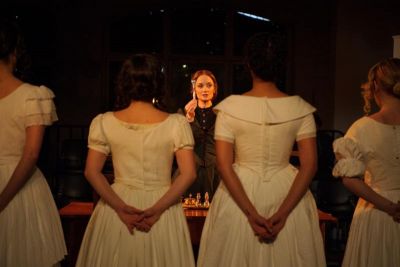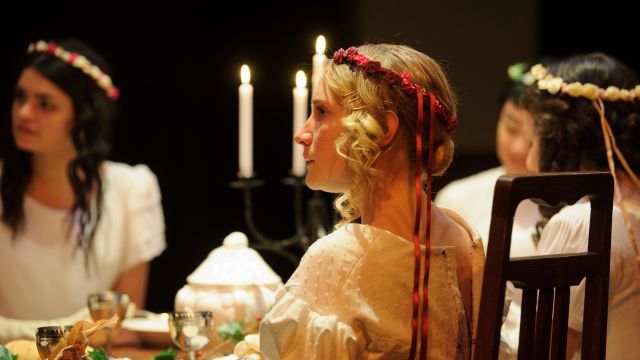Fallen
The premise of Fallen – as in ‘a fallen woman’ – is the suppression of women’s stories. Playwright Seanna van Helten sets her play in a real place, Urania Cottage, where suppression of women’s stories was explicit, stated policy. Urania Cottage – a ‘home of refuge and reform’, to quote the program notes from writer and director - was set up and overseen by Charles Dickens in the 1840s, to offer ‘young, destitute, underclass women the chance… to begin life afresh…’ But there were two conditions: ‘to emigrate to British colonies to become… servants and wives, and never [to] tell anyone about your past transgressions.’
It’s important to understand this historical foundation because the play itself is somewhat elliptical about it. We meet four (fictional) inmates – Isabella (Artemis Ioannides), Georgie (Veronica Thomas), Martha (Tahlee Fereday) and Julia (Gemma Bird Matheson). They are watched, spied on, supervised, educated and ‘reformed’ by the icy, manipulative but melancholy Matron (Zoe Boesen). Later, they are joined by Rosina (Jing-Xuan Chan), who (mysteriously) has an education and a sophistication way beyond the others. All are waiting on Matron’s approval that they are ready to leave and sail away to ‘begin afresh’.
 There is some fine acting here. The cast create clearly defined characters and the interaction between the girls, as they bicker, show affection, tease, roughhouse and spy on each other is impressively detailed and convincing – although there is only the slightest hint of the erotic. Isabella is – by default – the top girl by way of her irrepressible spirit and lack of inhibition (another fine performance from Ms Ioannides), while Georgie is her sly victim – and Ms Thomas plays sly and victim extremely well.
There is some fine acting here. The cast create clearly defined characters and the interaction between the girls, as they bicker, show affection, tease, roughhouse and spy on each other is impressively detailed and convincing – although there is only the slightest hint of the erotic. Isabella is – by default – the top girl by way of her irrepressible spirit and lack of inhibition (another fine performance from Ms Ioannides), while Georgie is her sly victim – and Ms Thomas plays sly and victim extremely well.
Martha is none too bright but she’s impetuous; Ms Fereday make us wonder what kind of future her character has in store. Julia is more brittle in her attempts to maintain some dignity and Ms Bird Matheson doesn’t get much variation in this underwritten character. Ms Chan intrigues as Rosina, who is smarter and therefore more ‘realistic’, maintaining a watchful calm.
It is the nicely judged and insightful interactions between the characters that holds our interest. Perhaps wisely, the girls do not attempt London slum girl accents, but on the other hand, we can never quite believe that they have been rescued from the streets, from lives of crime, prostitution or neglect. Perhaps we are to think that Matron is succeeding all too well in moulding them into ‘nice’, employable gels – with no past – but there’s very little toughness, coarseness, obscenity or streetwise survival instinct on show.
Apart from character interactions, power plays and reveals, there is, unfortunately, not a great deal else going on. It’s a situation rather than a story – which is ironic in a play about stories. We might wonder what clamp there is to keep these five women under the thumb of the peremptory Matron beyond the promise of a new (or at least different) life. Matron plays them off against each other via withheld approval, veiled threats, flattery, petty privileges and superior authority. Ms Boesen plays these things very well, but we might also wonder how come the girls take it from her, why they don’t see through her and discuss her among themselves, and why they don’t revolt. It takes almost the whole play until someone does.
 Director Penny Harpham chooses to play things in the round which means in this case about half the audience can neither see nor hear at any one time, compounded by the diction or projection problems of some of the cast. Chloe Greaves does a fine job with the costumes – ironic virginal white floor length dresses for the girls, deep green for Matron – but her stage with its removable floor boards – to reveal a vegetable garden – has the audience distracted that someone will step in a hole and break their ankle. Overall, there is a literal-mindedness about props and business with a mix of mime and real objects and furniture.
Director Penny Harpham chooses to play things in the round which means in this case about half the audience can neither see nor hear at any one time, compounded by the diction or projection problems of some of the cast. Chloe Greaves does a fine job with the costumes – ironic virginal white floor length dresses for the girls, deep green for Matron – but her stage with its removable floor boards – to reveal a vegetable garden – has the audience distracted that someone will step in a hole and break their ankle. Overall, there is a literal-mindedness about props and business with a mix of mime and real objects and furniture.
But perhaps the most unfortunate aspect of Fallen is that it is – in admirable intention perhaps – about the suppression of women’s stories. But is there a flaw in the play’s premise? What we see and hear on stage, over a very long two hours, is that the play itself suppresses these women’s stories. It gives us only bare and rather coy hints, so that we never know – or feel – the stories that are being suppressed. What were these girls’ crimes, their shameful transgressions? We learn more of Matron’s history than, say, Isabella’s – and we’d certainly like to know more of Isabella’s. But the context is 1840s Britain – not now. Yes, as Rebecca Solnit writes, quoted in the program, the girls’ stories are what they are, and it is dishonest and hypocritical and a denial of identity to suppress them, but was there another way – then, in the 1840s – ‘to begin life afresh’? The link, in the program, to #MeToo and #TimesUp, seems just a little naïve and, perhaps, opportunistic.
Michael Brindley
Photographer: Sarah Walker Photography
Subscribe to our E-Newsletter, buy our latest print edition or find a Performing Arts book at Book Nook.

